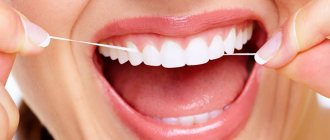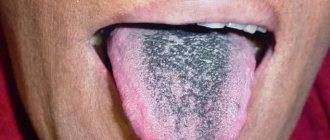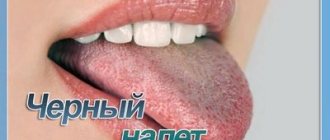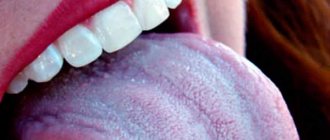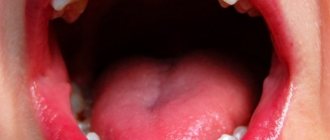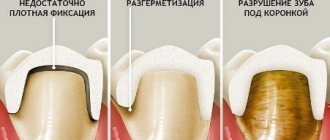What to do if your breath smells and an unhealthy coating appears on your tongue
Language is a kind of indicator by which one can judge a person’s health. Ideally, it should have a natural pink color, with a slight whitish, almost transparent coating. But signs of inflamed mucous membranes, redness and the presence of dense, unhealthy discharge should at least alert you. If a smell is added to everything else, you should immediately see a doctor - these could be signs of a tongue disease or a variety of malfunctions in the functioning of internal organs and systems. Today we will look at the reasons why an unpleasant odor appears due to plaque on the tongue and what pathological processes can contribute to this.
Bad breath, what is the reason?
What to do if you have a bitter taste in your mouth and a white coating on your tongue
Some medications cause a bitter taste. These include lithium preparations, antidepressants, antibiotics, allopurinol, vitamin and mineral complexes. Bitterness in the mouth can be combined with nausea, dryness, and a white coating on the tongue. Usually, special treatment for bitterness in the mouth after taking antibiotics or other medications is not required. The unpleasant taste disappears upon completion of the course of treatment and no longer bothers you.
What should you do if you have a bitter taste in your mouth and a white coating on your tongue that persists for a long time after taking medications? Contact your doctor. It may be necessary to prescribe hepatoprotectors - drugs that restore liver function. The treatment regimen for some diseases initially includes medications that “protect” the liver. This approach is practiced when prescribing chemotherapy drugs, especially with long courses and high dosages.
What causes the tongue to become coated and cause halitosis?
The combination of halitosis (bad breath) and the formation of a thick, suspicious coating on the tongue is a clear sign of problems in the functioning of certain body systems. This is not only obvious discomfort for a person, but also a signal that you need to visit a doctor. Here it is important to identify the true cause of the symptoms, the elimination of which will allow you to get rid of these unpleasant manifestations. So, a coated tongue and an unhealthy odor indicate the following points:
- low level of hygiene, due to which food residues accumulate on the teeth and mucous membranes, and this is a direct path to the rapid proliferation of bacteria,
- advanced form of caries,
- digestive problems
- problems related to the endocrine system,
- pathologies associated with the kidneys and liver,
- taking antibiotics and other powerful medications for an extended period of time,
- some diseases of the tongue.
On a note! It is not at all necessary that halitosis is a sign of some pathology. An unpleasant odor can also occur for other reasons that have nothing to do with diseases. For example, as a result of consuming certain foods, smoking or drinking alcohol. Toothpaste and a brush will come to the rescue. But an unnatural white or yellowish plaque in the oral cavity is a reason to consult a specialist for advice.
A disease such as candidal stomatitis, a fungal infection, can provoke the formation of cheesy plaque. Another common tongue disease is glossitis, which is accompanied by inflammatory processes in the tissues of the organ. But more often such discharge, combined with a bad odor, becomes a sign of disturbances in the gastrointestinal tract. For example, with gastritis, a dense white or yellowish film is often noted that covers the entire tongue. In addition to it, there is a feeling of insufficient moisture in the oral mucosa, a suspicious taste with bitterness or a sour tint.
This is what a fungal infection on the tongue looks like
“When I started to develop a noticeable white coating on my tongue, I immediately rushed to the dentist. The situation was still clouded by a sour smell, but I was sure that it was all due to some kind of dental disease. I brush my teeth strictly twice a day and try to maintain good hygiene, so these symptoms came as a real shock to me. But the doctor examined him, found nothing and sent me to a gastroenterologist. It was there that it turned out that I had gastritis! Maybe it’s been there for a long time, it’s just that nothing bothered me...”
Lyubochka91, Vladivostok, from correspondence on the woman.ru forum
If gastritis becomes chronic, the plaque usually becomes yellowish and denser. Ulcers of the stomach and duodenum manifest themselves as grayish discharge on the tongue1. In addition, the oral mucosa can change its color due to diseases of the ENT organs - scarlet fever or tonsillitis.
Yellow tongue or how to get rid of bad breath
Home Articles Popular information articles Nutrition and diets
Each of us, in the process of communicating with each other, notices that some people have bad breath, while others do not, some have bad breath and a tongue coated with a white-yellow coating, while others do not have this. And, interestingly, if there is a yellow coating on the tongue, there will definitely be bad breath!
Why does the tongue appear coated with a yellow coating and putrid odor from the mouth?
The cause of bad breath can be carious teeth, as well as diseases of the digestive system. Such diseases of the digestive system include, first of all, functional conditions of the valve apparatus of the stomach, when the contents of the stomach and intestines periodically reflux into the esophagus more than 2-3 times a day, especially at night, when you are in a horizontal position. This condition occurs when the sphincter apparatus of the stomach and esophagus is insufficient. The cause of episodes of reflux (or gastroesophageal reflux) of the contents of the stomach and (duodenogastric reflux) of the intestines can be observed due to poor nutrition (abuse of foods that cause a decrease in the tone of the sphincter apparatus of the stomach), taking medications of a similar effect (hypnotics, sedatives, antispasmodics, laxatives, etc.) frequent stress, prolonged physical activity, constipation, flatulence associated with increased intra-abdominal pressure. Reflux can also occur with alcohol abuse and smoking.
The presence of gastroesophageal functional reflux is a passing phenomenon, but when reflux is a consequence of organic disorders of the sphincter apparatus of the stomach and esophagus (esophagitis, gastritis, duodenitis, peptic ulcer, etc.), or damage to the brain or spinal cord, congenital or acquired, then in these cases we speak of gastroesophageal reflux disease (GERD). The main signs of functional insufficiency of the lower esophageal sphincter are heartburn, belching of food, pain in the stomach or chest area, a yellow coating on the tongue, the appearance of stains on the pillow after sleep, and rotten breath. The yellow color of the tongue is associated with the reflux of bile into the oral cavity (duodenooral reflux). The frequency of reflux increases in the evening and night hours. It has been established that in healthy people duodenogastric reflux is practically absent.
The presence of reflux leads to the development of diseases of the digestive system and not only; the reflux of contents from the stomach into the oral cavity leads to microaspiration into the tracheal cavity, which can affect the health of the respiratory system. Long-term microaspiration of contents often leads to the appearance of an obsessive cough, and subsequently to the development of lung diseases (chronic bronchitis, bronchial asthma...). Based on the above, it becomes clear that it is necessary to prevent functional diseases of the stomach and esophagus, and even more so to prevent the development of GERD, and when the first signs of gastroesophageal and duodenogastric reflux appear, it is necessary to take the most active measures to eliminate them.
Where to start, what should be recommended for patients with gastroesophageal reflux?
Nowadays, every person knows how to maintain health. Combating risk factors and preventing overstrain of the nervous system are not burdensome, truly accessible to everyone and highly effective. Physical education, proper nutrition, a rationally and intelligently structured lifestyle, work and rest schedule play an important role in them. Moreover, the final goal can be achieved only with comprehensive compliance with all recommendations throughout life. First of all, these include the complete abandonment of bad habits.
After eating at lunchtime, a walk is necessary and daytime sleep is allowed only after 1.5-2 hours. It is recommended to sleep with the head of the bed raised by at least 15-20 cm. You should avoid tight clothing, tight belts, and tight elastic bands of clothing. What happens if after a heavy meal a person lies down on his back? By the way, no animal sleeps on its back! With this position of the body, the gas bubble of the stomach moves to the front wall and not air, but acidic gastric contents are discharged into the esophagus. This is precisely the trigger mechanism for the development of gastroesophageal reflux.
Physical exercises should be with the exception of overstraining the abdominal muscles, deep bending, prolonged stay in a bent position, lifting weights of more than 6-7 kg on both hands. It is not recommended to inflate balloons or tubes with your mouth or engage in professional sports.
In terms of nutrition, you must adhere to a diet. You should limit or reduce the content of animal fats (cream, butter, fatty fish, pork, duck, lamb, cakes), increase the protein content, avoid irritating foods (strong broths, marinades, smoked meats, sour and irritating (pineapple) juices, tomatoes, citrus fruits, coffee, strong tea, chocolate, onions, garlic, alcohol, tobacco, spices), carbonated drinks. It is necessary to reduce the daily amount of food, and the number of meals can be increased. While eating, it is advisable not to be distracted or talk; food should be chewed thoroughly and not rushed. In addition, you should not eat before bed. Sleep is allowed 2-3 hours after the last meal. Patients with excess weight are recommended to reduce it.
The presence of reflux does not depend on age; it can also occur in children under one year of age. In the nutrition of children in the first months of life who are bottle-fed, special anti-reflux mixtures should be used, the peculiarity of which is a change in the ratio of casein and whey proteins towards casein, as well as the inclusion of thickeners in their composition (most often, carob gum.
Where to start drug therapy?
In children and adults in the initial stages of reflux development, it is necessary to start by taking a decoction of medicinal plants:
Oregano herb - 50.0 Plantain leaf - 40.0 Yarrow herb - 30.0 Linden blossom - 20.00
Brew 1 tbsp. for 250 water, leave for 2.5 hours, drink 1/2 cup 3 times a day 25 minutes before meals (dose for age 24 years). You need to take the herbal collection for 1 month. It is recommended to prescribe the collection for children from 2.5-3 months. Among medications, it is recommended to prescribe the drug Motilium. For adults (1 tablet x 3 times a day 15 minutes before meals for 10 days) and for young children in syrup, according to weight. This is the so-called symptomatic therapy; the main direction in treatment should be given to the disease that led to the appearance of pathological reflux. The presence of such complaints always requires contacting a gastroenterologist, who will prescribe the comprehensive necessary treatment. Functional disorders of the digestive system are a large group of diseases that are widespread in childhood and adulthood and have an ambiguous prognosis. In recent years, significant progress has been made in the treatment of functional disorders associated with the emergence of new effective drugs that regulate gastrointestinal motility. However, these remedies cannot provide a final solution to the problem: due to the significant role of the nervous system in the development of these diseases, their treatment must be comprehensive and carried out in collaboration with neurologists, psychologists, and psychoneurologists. Following our recommendations on this issue with a mandatory consultation with a gastroenterologist will help you get rid of bad breath and a coated tongue, and therefore improve your health.
Gastroenterological Center of the Chelyabinsk Region. Tel. to sign up for a consultation: 89026187717
Author: V.L.
Zemlyakov Printable version
What consequences can there be due to “dirty” language?
A tongue with an unnatural coating indicates that rapid proliferation of bacteria occurs on the upper layer of the organ's epithelium. The appearance of an unpleasant odor is not so bad. The danger of this phenomenon lies in the fact that during a meal a person involuntarily swallows part of the accumulated secretions, which can ultimately lead to intoxication of the body.
If the problem is not addressed, it can lead to decreased immunity.
Exceeding the permissible limit of bacteria in the oral cavity, toxins and fungal infections - all this leads to an inevitable decrease in immunity, due to which a person becomes more susceptible to various viruses and infections. At the same time, it will not be possible to mask the smell for a long time with the help of mint chewing gum and regular cleaning. It is necessary to find the root of the problem and eliminate it, especially since the reason may lie in serious pathological processes that can lead to dangerous complications for the entire body.
Causes of bitterness in the mouth after eating
The unpleasant taste usually disappears when the cause that caused it is eliminated. Diet errors (fatty, deep-fried foods), smoking, bad teeth, poor oral hygiene, and taking certain medications are potential causes of bad taste. However, dryness and bitterness in the mouth are also symptoms of gastrointestinal diseases. Biliary dyskinesia, chronic cholecystitis, cholelithiasis cause discomfort in the oral cavity. Also, the cause of a bitter taste can be diseases of the duodenum, chronic gastritis, enteritis, and colitis.
How to remove severe bitterness in the mouth and nausea? It is necessary to treat the underlying disease, the manifestations of which are these symptoms. But even after cholecystectomy, unpleasant symptoms may persist. Bitterness in the mouth after gallbladder removal is often associated with the so-called postcholecystectomy syndrome. If, despite following a diet, a bitter taste in the mouth persists for a long time after surgery, you should consult a doctor to identify the cause and prescribe appropriate therapy. The cause of bitterness in the mouth after eating can be simple overeating. In case of a large feast, you can take a tablet of an enzyme preparation (panzinorm, festal, mezim forte) during meals. But it is still advisable to adhere to the rules of a healthy diet: eat small portions 5-6 times a day, eliminate or limit the consumption of fatty and fried foods, drink more water. Then the question “how to treat bitterness in the mouth while eating” will not arise, and “bells” from the liver in the form of an unpleasant taste will not come.
Diagnosis of the problem
As mentioned above, a white or yellow tongue most often indicates problems with digestion. However, first it is better to visit a dentist so that he can rule out possible oral diseases that provoke the appearance of similar symptoms. If the doctor does not find other signs indicating dental disease, the patient will be referred to a gastroenterologist, virologist or endocrinologist.
If you find a problem, you need to contact a specialist
As part of the diagnosis, an ultrasound examination of organs located in the abdominal cavity, x-rays of internal organs, gastroduodenoscopy, urine, blood and stool tests can be performed.
Types of plaque
Plaque on the tongue varies in its characteristics, which are taken into account to make an accurate diagnosis. For example, the density of discharge plays an important role, which can tell a lot about the extent of the problem. The consistency is also taken into account - it can be wet or dry, fatty or curdled. The diagnosis will largely depend on accompanying manifestations, such as bad breath, the presence of inflammation on the mucous membrane, ulcers and other neoplasms.
However, the main visual criterion when making a diagnosis is the color of the discharge - white, as a rule, indicates candidal stomatitis or gastritis, while yellow usually results from prolonged antibiotic treatment or serious problems in the functioning of the gastrointestinal tract. But besides this, in medical practice there are often situations when the tongue takes on a completely unexpected color:
- brownish – alcohol abuse, problems with digestion and gallbladder function,
- gray – ulcerative processes in the stomach and duodenum, prolonged use of antibiotics,
- orange – acute gastrointestinal conditions,
- bluish – anemia caused by acute deficiency of vitamins and microelements,
- black – Crohn’s disease, intoxication of the body, liver pathologies,
- greenish – constant consumption of harmful foods, liver dysfunction.
Plaque on the tongue can be varied.
The localization of the discharge can tell a lot about the problem. For example, sometimes plaque covers the entire surface of an organ or even the oral cavity, in other cases it is concentrated only at the root, on the sides or at the tip. The discharge may be speckled or thick plaques. The doctor must take all these characteristics into account when making a diagnosis.
How to remove these symptoms
So, how to get rid of plaque on your tongue and what to do about the smell? The essence of treatment comes down to eliminating the true cause of the problem. If poor hygiene is to blame, it is enough to visit the dentist for professional cleaning of plaque and dental deposits. In the future, you should take care of your oral health, regularly brush your teeth and undergo preventive examinations. But what if everything is not so simple, and the cause of such annoying manifestations is pathological conditions. In this case, the treatment method will be selected taking into account the specific disease:
- dental problems: a specialist will heal carious cavities, and if plaque and odor appear from a tongue disease, appropriate treatment will be prescribed using antiseptic, antifungal, anti-inflammatory drugs or antibiotics,
- systemic pathologies: first you will have to undergo examination by specialized specialists. Only after the diagnosis has been confirmed, the doctor will be able to prescribe the necessary therapy, during which the symptoms will gradually disappear by themselves,
- bad habits: when the cause of the problem is an addiction to tobacco smoke or alcohol, the only way out is to give up bad habits or at least minimize them.
You can get rid of the unpleasant odor using pharmaceutical products.
During treatment, you can remove discharge with a regular toothbrush, but it is better to consult a doctor about this. If the tissues are inflamed, such cleaning may be contraindicated. But you can get rid of the unpleasant odor using pharmaceutical rinses or decoctions of medicinal herbs - St. John's wort, chamomile, nettle, sage or mint. Remember: this is only a temporary measure to muffle obvious symptoms that cause some discomfort in everyday life. However, hiding the signs of a problem is not the same as solving it.
Other causes of bitterness in the mouth
Why there is a constant bitter taste in the mouth - possible reasons:
- smoking;
- inhalation of vapors of certain chemicals;
- dehydration;
- glossitis;
- dry mouth;
- allergy;
- salivary gland infections;
- lack of zinc and vitamin B12;
- nasal polyps;
- autoimmune diseases such as Sjögren's syndrome and Bell's palsy;
- mouth breathing;
- inflammatory diseases of the upper respiratory tract;
- injuries to the head, mouth, nose;
- braces;
- Radiation therapy to the neck or head.
Bitterness in the mouth in the early stages of pregnancy may be associated with changes in hormonal levels, attacks of nausea and vomiting (toxicosis). Read more about this symptom on our website.
Oral hygiene
Constant oral care, maintaining a proper level of hygiene and a responsible approach to the health of your body is an excellent prevention of many dental and other diseases, including those that provoke the symptoms in question. Experts advise following these recommendations to minimize the risk of halitosis and oral discharge:
- daily hygiene, cleaning at least 2 times a day, and even better - after each main meal,
- rinsing your mouth after meals and even snacks - plain water will do,
- limiting sweets and fatty foods,
- giving up cigarettes and alcohol,
- an active lifestyle and regular consumption of natural foods rich in beneficial vitamins and microelements.
Regular brushing of your teeth and tongue will help avoid the problem.
If you notice the first suspicious signs of the disease, you should consult a doctor. Preventive examinations at the dentist’s office are never superfluous, especially since regular visits to this specialist will identify the problem in the early stages of development, and therefore quickly solve it.
How to clean your tongue
If you don't have any health problems that affect the plaque, just follow these guidelines and remember to brush until all the plaque is removed and your tongue is pink again. Typically, tongue hygiene takes only 20–30 seconds.
Recommendations for adults
- Proceed with the procedure only after brushing your teeth
and rinsing your mouth. - Use special tools
: scrapers, nozzles and others. - Clean your tongue using sweeping movements
and light pressure. - Start from the root of the tongue
and end with the tip. - Do not brush your tongue with cross movements and do not press
too hard - this can damage it. - Don't forget to clean the instrument
after the procedure. - Be sure to rinse your mouth
with water.
Should children have their tongues cleaned?
Children also need tongue care, but not earlier than 3–4 years.
For younger children, tongue cleaning is pointless. They don’t eat junk food, especially not in the same quantities as adults, and they don’t drink tea and coffee. Until 3–4 years of age, normal oral care is sufficient. From 3–4 to 8 years
This is how you should clean your tongue.
- Move from the root of the tongue to the tip
with smooth sweeping movements, with even weaker pressure than with adults. - Similarly, clean the sides
of the tongue and the inside of the cheeks. - Be sure to rinse your mouth
.
From the age of 8
you can already use scrapers.
Recommendations for health improvement
The cause of most health problems is reduced immunity. To strengthen and maintain it, procedures for hardening the body will be useful, which are recommended to begin in childhood. In addition, experts advise taking multivitamin complexes from time to time, enriching the diet with fresh fruits and vegetables, and not forgetting the importance of physical activity. You don’t have to buy a gym membership and torture yourself with daily workouts. It is enough to walk every day in the fresh air, visit the pool once a week or, for example, ride a bike. Taking care of your health is the best prevention of any disease.
- Banchenko, G, V. Language is the “mirror” of the body: wedge, a guide for doctors, 2000.
